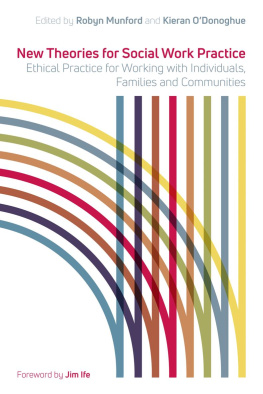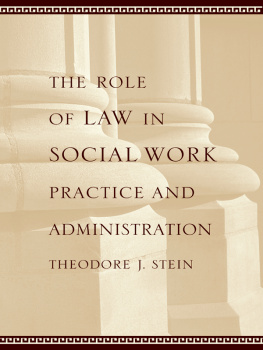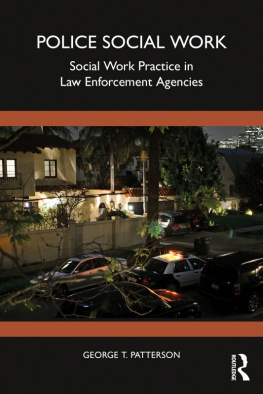First published 2002 by Ashgate Publishing
Published 2017 by Routledge
2 Park Square, Milton Park, Abingdon, Oxon OX14 4RN
711 Third Avenue, New York, NY 10017, USA
Routledge is an imprint of the Taylor & Francis Group, an informa business
Copyright Caroline Ball, Ann McDonald and Janice McGhee 2002
All rights reserved. No part of this book may be reprinted or reproduced or utilised in any form or by any electronic, mechanical, or other means, now known or hereafter invented, including photocopying and recording, or in any information storage or retrieval system, without permission in writing from the publishers.
Notice:
Product or corporate names may be trademarks or registered trademarks, and are used only for identification and explanation without intent to infringe.
British Library Cataloguing in Publication Data
Ball, Caroline, 1938-
Law for social workers. - 4th ed.
1. Social workers - Legal status, laws, etc. - Great Britain 2. Public welfare - Law and legislation - Great Britain I. Title II. McDonald, Ann III. McGhee, Janice
344.4'1'0313
Library of Congress Cataloging-in-Publication Data
Ball, Caroline, 1938-
Law for social workers / Caroline Ball and Ann McDonald.-- 4th ed.
p. cm.
Includes bibliographical references and indexes.
ISBN 978-0-7546-1777-8 (alk. paper) -- ISBN 978-0-7546-1778-5 (pbk: alk. paper)
1. Social workers--Legal status, laws, etc.--Great Britain.
I. McDonald, Ann, lecturer in social work II. Title.
KD3302.B35 2002
344.41'0313--dc21
2002024927
Typeset by IML Typographers, Birkenhead, Merseyside.
ISBN 13: 978-0-7546-1778-5 (pbk)
ISBN 13: 978-0-7546-1777-8 (hbk)
The law is organic, developing and changing to adapt to societal, demographic and professional practice shifts. This edition, in which Janice McGhee addresses the many changes that devolution has brought to the very different legal context of social work practice in Scotland, also benefits from the move from sole authorship to the complementing interests of co-authors.
The way in which this text has evolved and expanded since the first edition was published in 1986 reflects massive changes in social work related practice. In particular, since the last edition in 1996, the establishment of separate training for probation officers and the introduction of multi-disciplinary youth offending teams has required substantial expansion of the criminal process and youth justice chapters. Additionally, in recognition of the more diverse needs for up-to-date, relevant, legal information of those working in or training for social work related practice across the statutory, voluntary and private sectors, discrimination, community care and those areas of law such as social security, education and housing which impact on clients lives are addressed in more detail.
The accelerated pace of the change in social work practice since the last edition in 1996 is reflected in the reform of the statutory framework of most areas of that practice. Since the general election of 1997, the Government has introduced legislation to effect specific and far-reaching reforms relating to most client groups, although reform of the Mental Health Act 1983 is still awaited. In addition, permeating all areas of practice, the Human Rights Act 1998 not only requires the decisions of all public bodies to be compliant with the European Convention on Human Rights but allows breaches to be challenged within the domestic courts.
Implementation of the new enactments is at different stages. The reforms introduced by the Crime and Disorder Act 1998 and the Youth Justice and Criminal Evidence Act 1999 have already resulted in the formation of local multi-disciplinary youth offending teams and wholesale changes throughout the youth justice system. The Child and Family Court Advisory and Support Service (CAFCASS) has, somewhat chaotically (White, 2001; Gerlis, 2002), replaced panels of guardians ad litem and reporting officers and probation service court welfare officers. Implementation of parts of the Care Standards Act 2000, which reforms the regulatory system for health and social care services, has introduced some radical reforms including the introduction of Social Care Councils, replacing the Central Council for Education and Training in Social Work (CCETSW) in each of the four countries of the United Kingdom. The General Social Care Council has become the regulator for social work practice, and the new Care Standards Commission has assumed inspectorial responsibilities for a wide range of adult and child care services. The rest of the 2000 Act will come into force in January 2003. After a lengthy gestation, the Adoption and Children Act 2002 will shortly be on the statute book, as yet without any of the fine detail that will appear in rules, regulations and guidance.
Nor does it stop there. The summer of 2002 has seen two further important developments. In June the government published in draft form a Mental Health Bill to enact proposals set out in the white paper Reforming the Mental Health Act (Department of Health and the Home Office, 2000), and in July the long-awaited white paper Justice for All (Home Department, 2002) with wide-ranging proposals for reform of the criminal justice system. We have been able to include some references to both of these developments.
Whatever the pace of implementation of what is already enacted, new legislation, and the anticipated new curriculum for social work training, we hope that this new expanded edition, with its cross referencing to relevant research, will assist students and practitioners towards an understanding of social work and probation service related law in its practice context.
Caroline Ball
and
Ann McDonald
August 2002









